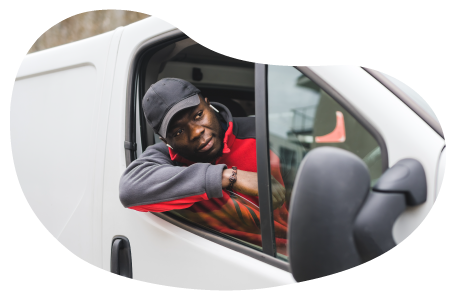

Commercial auto insurance
Commercial auto insurance
Commercial auto insurance can cover property damage and injuries if a company's vehicle is involved in an accident. It also covers vehicle theft and certain types of damage.
Why do you need commercial auto insurance?
If your small business owns a vehicle, you will most likely need commercial auto insurance. Almost every state requires commercial auto coverage for business-owned vehicles.
Commercial auto insurance provides financial protection if you or your employees are involved in an accident. This includes coverage for:
- Medical expenses from injured persons involved in an accident
- Property damage from an accident, theft, vandalism, or weather-related incident
- Liability claims from parties involved in an accident
- Uninsured motorists
Even if business auto insurance is not required in your state, it's still a good idea to get it for added protection and peace of mind. Without a commercial auto policy, you will be held responsible for paying medical bills and other expenses out-of-pocket if your company vehicle is involved in an accident.

Small businesses that purchase commercial auto insurance:
- Sell and deliver products
- Drive to and from worksites
- Haul equipment and tools that are used for work
- Require employees to use a company vehicle to perform tasks or services
Find commercial auto insurance requirements in your state

What does commercial auto insurance cover?
Commercial auto insurance offers financial protection if your business vehicle is involved in a car accident.
Specifically, this policy provides coverage for:
Liabilities
Liability coverage, including bodily injury liability, is important for any small business that owns and operates a vehicle. Each state has its own requirements for this type of insurance.
The coverage included in commercial auto insurance pays for:
- Damage to another person’s vehicle or property if a company vehicle is in an accident
- Bodily injury or death if the driver of your company vehicle is at fault in an accident
- Legal defense costs if another person sues over the incident
Medical expenses
Commercial auto insurance policies that include medical payments coverage, or MedPay, will cover medical expenses for anyone in your company vehicle who is injured in an accident, regardless of who is at fault.
Uninsured motorists
Even though auto insurance is mandatory in most states, many drivers still do not have it. If an uninsured driver hits your company vehicle, uninsured motorist coverage pays medical expenses for the people in your company vehicle. It may also pay for damages to the vehicle.
Twenty-two states require uninsured motorist bodily injury coverage. Some states require uninsured motorist property damage coverage, and other mandate underinsured bodily injury coverage.
Physical damages
Two optional types of commercial auto insurance coverage pay for physical damages or replacement of your company vehicles:
- Collision coverage covers your vehicles when they are in an accident.
- Comprehensive coverage pays for damage to your vehicles from other incidents, such as theft, vandalism, fire, or storms.
How much does commercial auto insurance cost?

TechInsurance customers pay an average of $147 per month for commercial auto insurance coverage.
Commercial auto insurance costs are based on several factors, including:
- Number of vehicles
- Type of vehicles, such as sedans or pickup trucks
- Employee driving records and demographics
- Coverage options selected
- Claims history
- Policy deductible and limits
Who should get commercial auto insurance coverage?
Any company that owns a business vehicle should purchase commercial auto insurance. In fact, most states require it.
Even if your state doesn't require this coverage, any small business owner who owns and uses a company vehicle could benefit from this policy as part of their risk management plan. This is doubly true if you drive from one worksite to another in order to provide services.
That's why commercial auto coverage is especially crucial for some professions, including:
Computer repair businesses
Computer repair shops often use commercial vehicles to transport equipment or commute to their clients' homes or offices. A commercial auto policy would keep their company vehicles protected while running these errands.
For example, a technician drives the company van on a snowy day to provide computer repair services for a client. On the way back to the office, the van slides on ice and hits a telephone pole, denting the hood. Collision coverage would cover the cost to repair the van.
IT staffing firms and trainers
IT staffing companies and IT trainers often work with different types of businesses across multiple locations. For many, a business vehicle is a must in order to create and maintain these relationships. Commercial auto coverage would keep their company vehicles safe while making these trips to meet clients.
For instance, the owner of an IT staffing company travels with an account manager in the company car to meet with a client. Before reaching the meeting, the car rear-ends a bus and the driver and passenger sustain injuries. The company's commercial auto policy would cover their medical expenses.
Telecommunications companies
Telecommunications companies usually send out installation specialists in business vehicles to perform services for their clients at a variety of businesses and job sites. If their installation specialists are involved in a car accident, commercial auto coverage would provide the necessary financial protection for all covered vehicles.
For example, an installation specialist at a telecommunications company falls asleep at the wheel while returning from a job, hitting another vehicle. The passengers in the other vehicle sustain major injuries and sue the company.
Commercial auto insurance would cover the damages and medical costs for the individuals in the other vehicle, as well as legal fees associated with the accident.
Construction companies
Construction companies usually need to drive to different worksites for their projects. Commercial vehicle insurance keeps contractors safe when driving in a business vehicle.
For instance, three technicians for an HVAC business take the company van to a client's home to install a new furnace, and collide with a car that ran a red light. The technicians are injured, but the at-fault driver is uninsured. The company’s commercial auto policy’s uninsured motorist coverage would help pay for their medical payments.
Trucking businesses
Trucking businesses must carry commercial auto insurance to comply with state laws. They often need coverage to comply with federal laws as well.
If an owner operator gets into an accident, their truck and its cargo could be damaged. Truck owners usually invest in cargo insurance in addition to other types of auto insurance, in order to cover all of their risks.
Top professions that need commercial auto insurance
Don't see your profession? Don't worry. We insure most businesses.

Some business insurance policies are required by laws or contracts. Others can help your small business stay afloat when property damage, a business interruption, or a lawsuit threatens to pull you under.
What isn't covered by commercial auto insurance?
Commercial auto insurance doesn’t cover every risk associated with owning a business vehicle. Some exclusions include:
Personal, leased, or rented cars
Many companies depend on employee-owned vehicles or rent a vehicle to conduct business. But commercial auto insurance does not cover personal, leased, or rented vehicles. And your business can still be held accountable if an employee gets into an accident in a personal or leased vehicle.
Hired and non-owned auto insurance (HNOA) is made for vehicles that your business uses but does not own. This policy is recommended for small businesses where employees regularly drive their own cars for work purposes. You can typically add it to your general liability insurance or commercial auto policy as an endorsement.
Recently purchased vehicles
If you purchase a company vehicle and it's not yet covered by your commercial auto insurance policy, you would still be responsible for any liabilities that may occur to the vehicle.
In order to protect any recently purchased business vehicles, you should get auto liability insurance which offers a temporary extension of your commercial auto coverage. It can also provide protection for any hired and non-owned vehicles that you use for your business.
Clients' vehicles
If your business is storing or performing service on a customer's vehicle, it would be not covered under your commercial auto policy. If something were to happen to your customer's vehicle, such as damage from a break in, you would be responsible for repairs and other related expenses.
Auto repair shops, dealerships, and other auto services businesses should carry garage keepers insurance to protect against theft or damage to customer vehicles in their care.
General liability insurance
Business owner’s policy (BOP)
Workers' compensation insurance
Errors and omissions insurance
Cyber liability insurance

Other common FAQs about commercial auto insurance
Are you required by law to purchase commercial auto insurance?
All states but New Hampshire require commercial auto insurance for vehicles registered to a business.
Most states specify the minimum amount of liability coverage required by state for bodily injury and property damage. In some instances, they also require a minimum amount of uninsured and underinsured motorist coverage.
Even if your business operates in the one exempt state, you're still liable for damages if your company vehicle is involved in an accident.
What is the difference between collision vs. comprehensive insurance coverage?
Comprehensive coverage will protect your business if you're involved in an accident with non-collision damage, such as natural disasters, hitting an animal, fires, and natural disasters.
Collision coverage protects your business when your vehicle collides with an object, such as a light pole.
Check with your insurance agent to verify your coverage amounts.
Do you need commercial auto insurance for personal or borrowed vehicles?
Many small businesses rent cars or use employee-owned vehicles to meet with clients, run business errands, or transport goods or employees.
Hired and non-owned auto insurance covers business liabilities if accidents occur while using personal or rented vehicles for business purposes. HNOA typically provides coverage for legal defense costs, but it doesn't cover damages to the rented or employee-owned vehicle.
What is the difference between commercial and personal auto insurance?
Commercial auto liability policies are designed for company cars that cover a lot of ground. Policies typically have higher coverage limits to account for the increased risk.
Personal auto insurance policies only cover claims related to personal use, including your commute and travel unrelated to work. They have lower limits and usually cost less.
If you’re involved in an accident while driving your personal car for work, your car insurance company might refuse your claim. That’s why independent contractors or sole proprietors who own a car used for work should consider commercial auto insurance or hired and non-owned auto insurance.
If you’re uncertain which policy you need, check with an insurance agent.
How do you get a certificate of insurance?
TechInsurance is a trusted insurance expert for all small businesses, including contractors and consultants, with extensive knowledge of the IT sector.
With TechInsurance, you can easily download a certificate of liability insurance for your small business, often on the same day you buy commercial auto coverage or another commercial policy, such as general liability or workers' compensation. TechInsurance insurance agents are available to help you with this process.
This comes in handy for companies and consultants that need proof of insurance to sign a contract and don’t have time to call an insurance company for documentation. Clients may ask for a certificate of commercial auto insurance to show you’re insured.
How to get cheaper commercial auto insurance
Complete an easy online application to get free quotes from top-rated U.S. insurance companies. You can keep your premiums low by shopping around and comparing quotes.
Our licensed insurance agents will help you to identify the best types of coverage and endorsements for your business needs. Having the right insurance will ensure that your business is protected from costly risks.





















